Patron of New Zealand Rugby, Member of the Order of the British Empire, 2003 inductee to the World Rugby Hall of Fame and his name enshrined upon the winner of the Heartland Championship player of the year award are a few of the accolades that Ian Kirkpatrick has achieved in rugby.
‘Kirky’ captained the All Blacks 43 times in his 113 matches and as the outstanding flanker of his era he appeared in 38 consecutive Tests from 1967 to 1977 – the ever constant in an often turbulent period for New Zealand rugby.*
The 1971 Lions won a four-match series against depleted hosts, Keith Murdoch was sent home from Cardiff in 1972, disappearing into exile and remaining a figure of infamy for the rest of his life. Two controversial tours of apartheid South Africa resulted in series defeats and political fallout.
Kirkpatrick suffered public indignities he did not deserve. He had no official warning he was being replaced as All Blacks captain and was told of the change along with everyone else under the Athletic Park grandstand after the 1974 trials.
In 1977 he was informed by his brother Colin on the Poverty Bay team bus of his omission from the tour of France.
How did Kirkpatrick maintain a level head at the time and became a totara of the sport?
“I always tried to be myself and treat others the way I wanted to be treated,” Kirkpatrick responded.
“When I first made the All Blacks Brian Lochore was captain and he was very open and welcoming. I wasn’t into table thumping or shouting at guys behind the posts. We talked about a strategy for the game the night before and I just tried to encourage the guys to express themselves.
“It was very different back then. You didn’t have three or four plans for every phase in every part of the field. I tried to say things that players wanted to hear. The thing is to hit the spot, not for too long, and then leave it with them.”
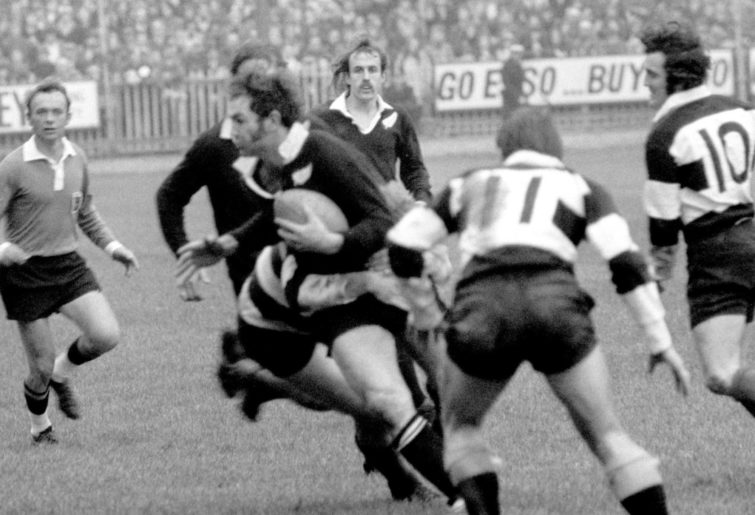
(Photo by S&G/PA Images via Getty Images)
Fast, strong, brave, understated, and intuitive, Kirkpatrick was ideal for navigating the pressures of international rugby. There was no better example of his exceptional quality than the second Test of the 1971 British Lions series at Lancaster Park, Christchurch.
Down 1-0 in the series, Kirkpatrick scored a try, surging 60 metres solo, that’s been replayed over and enshrined in legend.
“I get a bit embarrassed when it’s shown all the time. It’s like I’m a different person. It just happened, a spur of the moment thing.
“There was a maul from the lineout and ‘Pinetree’ (Colin Meads) gave me the ball and I did what I did, ran a good line to use modern language. I always liked fending and the angle at which the defenders were chasing me allowed me to use my fend to advantage.”
The All Blacks won the Test 22-12 with Kirkpatrick’s decisive moment happening six minutes before fulltime. The All Blacks were leading 16-6.
Before the third Test Kirkpatrick injured rib cartilage while playing for Poverty Bay-East Coast against the tourists, an injury worsened while taming a horse.
With his own doctor unavailable he went and saw another doctor, 1950 British Lion Bill McKay, who persuaded Kirkpatrick he’d naturally heal. It was hopeless. He shouldn’t have played but had to be picked, battling manfully in a 13-3 defeat.
In the same Test, flyhalf Bob Burgess swallowed his tongue, inside centre Howard Joseph tripped over a dog and Brian Lochore came out of retirement 48 hours before kickoff, playing his only Test at lock. It’s any wonder the All Blacks lost the series.
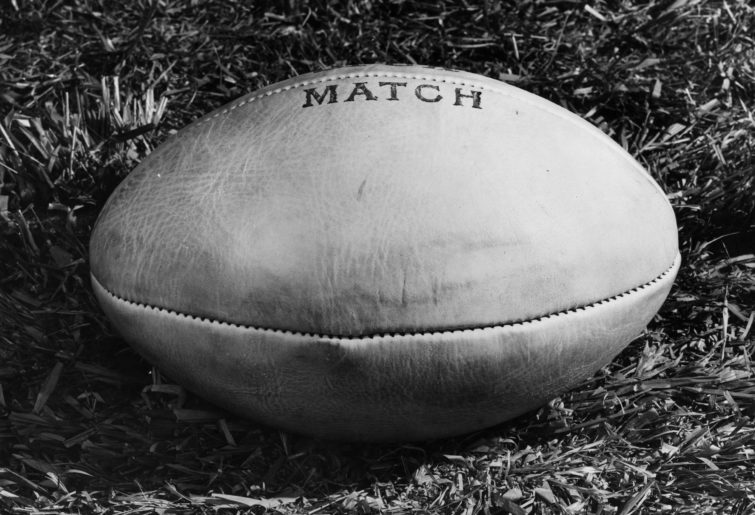
(Photo by Fox Photos/Getty Images)
“We always took a team photo on Thursday after training. BJ was so late he was an insert in the bottom. I reckon I was the last to run out because I was being jabbed with a big needle. I’m not even sure it went in.
“The Lions played differently in the Tests. In the mid-week games they moved the ball and scored a lot of tries. In the Tests they kicked a lot, took few risks. Their coach Carwyn James was very astute. I think their series win in ’71 influenced a lot of the thinking and reporting of the ’72 tour. The British press was expectant but it didn’t quite happen how they wanted it to.”
In 1971, Kirkpatrick was a part of the President’s Overseas XV that was chosen to play against England to celebrate the centenary of the Rugby Football Union, scoring two tries in the 28-11 win at Twickenham.
Kirkpatrick was the obvious captain for the 1972-73 All Blacks tour, unfortunately best remembered for the controversial sending home of prop Keith Murdoch after an altercation at the Angel Hotel in Cardiff following the 19-15 win over Wales.
“It should have been, ‘he goes, we go’. I’m not quite sure what that would have done with things. I just feel probably looking back I was too young to make a real stand.
“The manager had the right to do what he [did]. If he wanted to send a player home, he could. I really blame myself for that and I don’t mind wearing that. It’s not done easy but if you deserve it, you take it and get on with it.”
Kirkpatrick did get on with it. Despite added media focus on a lack of team discipline, a campaign highlighting crooked scrum feeds by Sid Going and an unsettled coaching staff, the All Blacks finished within a whisker of a Grand Slam.
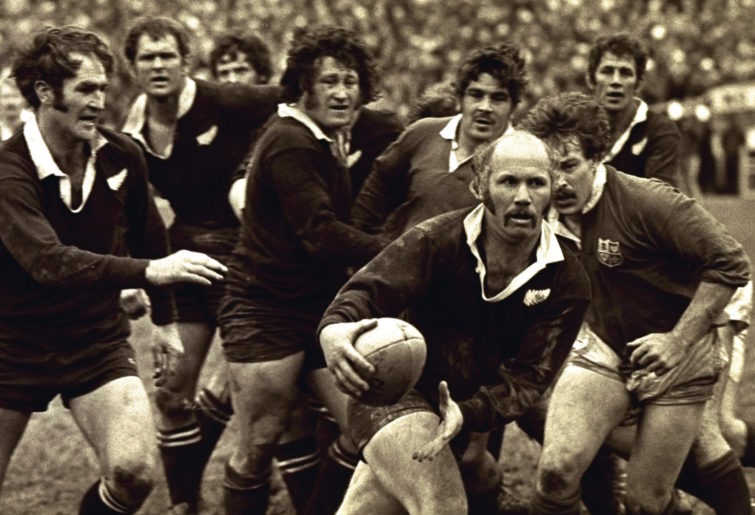
Scrumhalf Sid Going. (Credit: Adrian Murrell/Allsport/Getty Images)
They beat Scotland (14-9), Kirkpatrick scored a try in the 9-0 whitewash of England, and Ireland only earned a 10-10 draw after a late try. Centre Bruce Roberston told Keith Quinn in Legends of the All Blacks in 1999:
“Kirky was a great player and a good leader. He probably didn’t get the support of us as players as much as he could have when he was leading the 1972-73 team through Britain. The tour didn’t go as well as it should have and looking back, perhaps it was because the players didn’t support Kirky as well as we could have.”
If support was lacking in the UK, the All Blacks were essentially hung out to dry in a 1973 internal tour which replaced a cancelled trip to South Africa.
Playing twice a week on Wednesday and Sunday, the All Blacks suffered embarrassing defeats to the Junior All Blacks (14-10) and the President’s XV (28-35).
The President’s match was a hastily arranged Colin Meads benefit, which saw Sid Going swap sides as Tane Norton and Ken Lambert did for the Maori. New coach Jack Glesson struggled to inspire.
The next year with JJ Stewart as coach Kirkpatrick was sacked as All Blacks captain, a decision never satisfactorily explained. At a provincial level Kirkpatrick was in career-best form.
The 1974 Poverty Bay side was one of the union’s finest. Under the guidance of Tony Sheehan they won ten of their 13 outings, stamping their authority on the region with victories against East Coast, Thames Valley, Bay of Plenty and Hawke’s Bay as well as Auckland.
The Bay drew with Japan and lost only to Bay of Plenty and Marlborough. His club Ngatapa successfully defended the Poverty Bay senior championship.
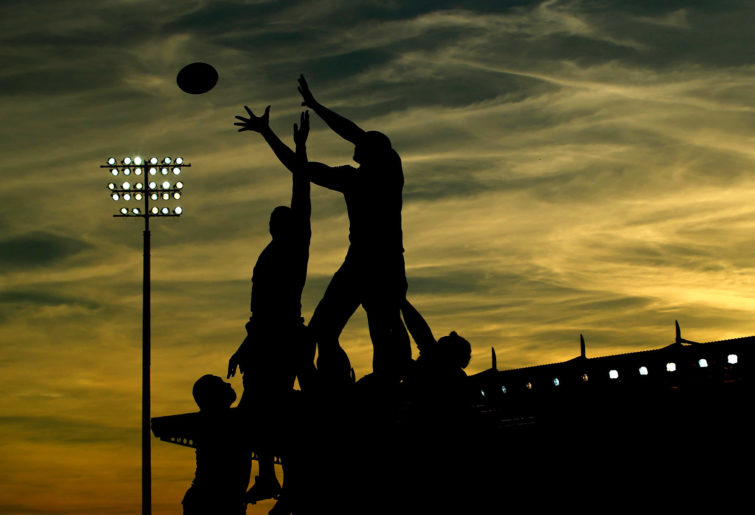
(Photo by Richard Heathcote – World Rugby via Getty Images)
Replacement All Blacks skipper Andy Leslie praised Kirkpatrick for his unconditional support on the successful 1974 Australian tour. Kirkpatrick scored tries in both Test wins.
Kirkpatrick was raised on a farm in Patutahi, 15 kilometres out of Gisborne. Brothers John and David were both Poverty Bay representatives, and his father played for the New Zealand Battalion in Egypt. Additionally the Kirkpatrick family were fine horseman and Poverty Bay polo players.**
“Polo was vibrant back then. It was competitive and accessible. Today they are struggling for numbers and money. Kiwi players always had a bit of a reputation for being rugged. We weren’t like the royals you see on the news.”
All Blacks Mick Cossey was the equivalent of coaching royalty for Kirkpatrick. At intermediate he was a prop of rupture, switching positions at King’s College, Auckland.
Kirkpatrick was in the First XV from 1962 to 1964, helping the side win the fiercely competitive 1A championship in 1963. He was first XV captain and head prefect in 1964. Additionally he was the school boxing, sprint, hurdles and pole vault champion.
“King’s was a whole new world for me. It fueled a desire for success and gave me a sense of order I didn’t have. I was lucky I played with older teams. That helped me fit in easier with the seniors. There was a bit of a hierarchy in those days.”
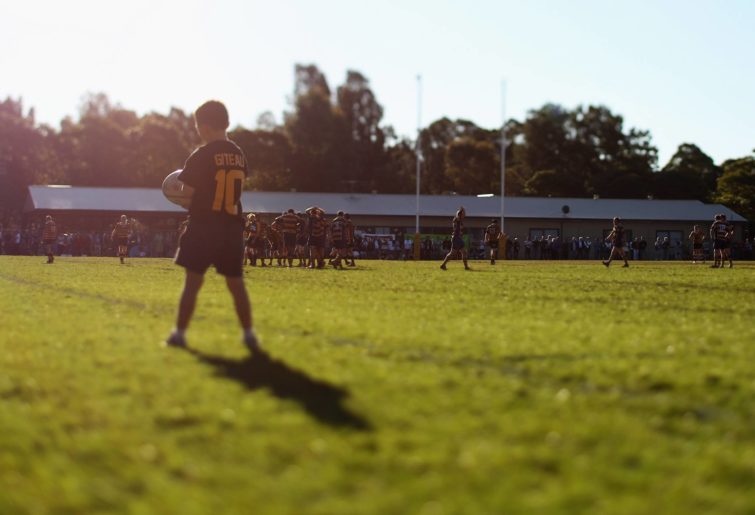
(Photo by Mark Kolbe/Getty Images)
At the top of the King’s hierarchy was eccentric headmaster Geoffrey Greenbank. He coached Kirkpatrick in the 3A team and was a key mentor despite being known for administering the cane after midnight, appointing staff and prefects without board consultation, hosting tackle practice on a hardwood floor and once setting up a tackle bag in a gum tree and watering the ground below, expecting his players to rush forward and hit the bag.
His best mate and fellow All Black Hamish McDonald attended King’s with Kirkpatrick who today has a scholarship at the college bearing his name.
After a season with Poverty Bay in 1966, Kirkpatrick hit Canterbury in 1967 to gain greater experience in rugby and farming while completing three months’ national service military training.
His progress was so rapid he was a shock selection for the 1967 All Blacks tour of the UK and France. His form in the midweek fixtures saw him score five tries in his first six games. He usurped the great Kel Tremian, earning Test selection in the 21-15 win over France in Paris.
“I broke my nose after a quarter of an hour. We didn’t have a specialist doctor so I played on. There was no way I was coming off the field in my debut.
“Pinetree called that the dirtiest game he played in. The French were a good side, tough. The try I scored was one of the most meaningful of my career and I remember Pinetree passed it to me.
“Kel Tremain was a sensational guy. Lively, supportive and smart. On tour we had a committee that would help us make some extra money to complement our small allowance. He’d sell the Test tickets he was given at double the price and always had schemes going that allowed us to have a few extra beers.
“That tour was the legacy of Fred Allen. He decided we would use the backs more and play with greater structure. There was a reason he was called ‘Needle’ because he would needle you.
“Fred would blow his whistle and shriek at you for not working hard enough, but you never knew when or who would be picked out. We respected him because of his knowledge and manner, but he kept us on edge the whole time.”
Kirkpatrick was sitting on the edge of a members stand seat at the Sydney Cricket Ground*** in 1968 when he’d soon be summoned for historic duty.
The replacement of injured players was added to the laws and Kirkpatrick would become the All Blacks’ first injury substitute with devastating results. He scored three tries in a 27-11 win.
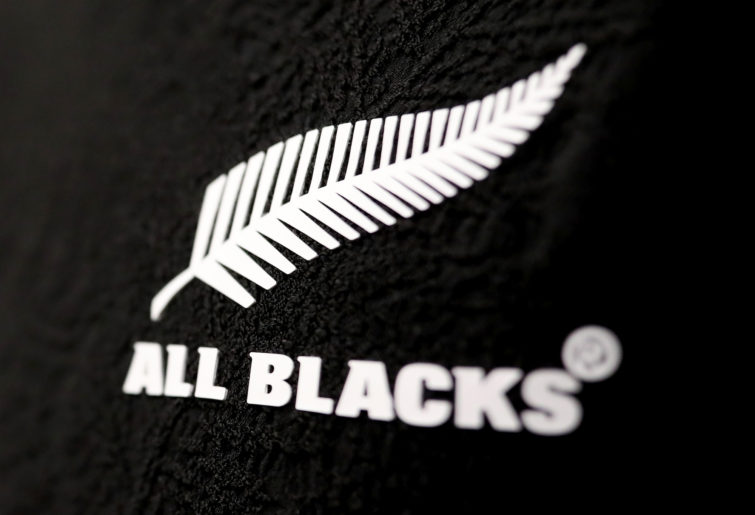
(Photo by Hannah Peters/Getty Images)
He was the first All Black to score three tries in a Test since Pat Caughey scored three tries against Scotland in 1935. Ironically Caughey was educated at King’s College and was later knighted for hospital services.
“BJ (Lochore) tore his hamstring and broke his thumb so the warm-up was walking down the stairs of the members stand. I don’t remember the tries, I think I fluked them.”
Kirkpatrick had broken his thumb shortly before the match but didn’t disclose the full extent of the injury to the selectors, paying an Australian Olympic shot put representative $2 for regular massages.
In 1969 Canterbury broke the 24-defence Ranfurly Shield tenure of Hawke’s Bay – the well-prepared visitors withstanding a late charge to prevail 18-14.
“On the way back to Christchurch we stopped at the Grand Hotel in Wellington where the All Blacks had always stayed. We had a few beers and we missed the bloody flight.
“Captain Ian Penrose was the only forward at the airport where 10,000 people were waiting for us. The Canterbury rugby union did nothing for us after that.”
Kirkpatrick was highly regarded enough to be appointed South Island captain, scoring a try in a rare 13-3 win over the North Island at Athletic Park.
In 1973 he would become the first, and only, man to captain both islands to victory when he led the North to a 27-14 success in Whangarei. It was 4-4 at halftime with the second half broadcast on live TV a rarity in those days.
International sporting contact with South Africa would become increasingly rare in the ’70s – the notable exception being the All Blacks, who toured the Republic in 1970 and 1976. The 1967, 1973 and 1985 tours were called off.
In 1986 Kirkpatrick managed the Cavaliers, basically the All Blacks minus David Kirk and John Kirwan. South Africa won a series marred by foul play. Northern Transvaal flanker Burger Geldenhuys punched Cavaliers captain Andy Dalton from behind, ending his tour.
Kirkpatrick admits he was “never comfortable” with apartheid but adpoted the position of many leading players at the time and that playing South Africa was the “ultimate challenge”.
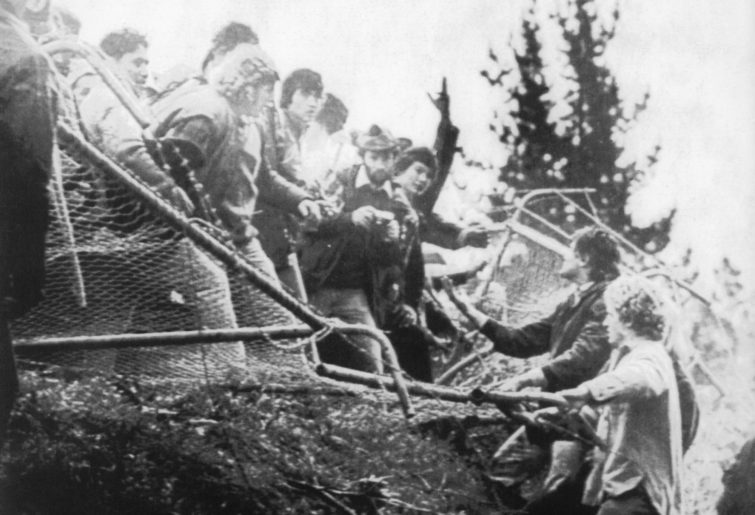
The Springboks’ 1981 tour of New Zealand sparked violent riots and tore deep social rifts. (Getty Images)
In 1970 the All Blacks were imperious in the midweek games, winning all 22 matches. However in the Tests they struggled to combat a well prepared South African forward unit and struggled with disruptive officiating, employing 27 players across four Tests to try and reduce the penalty count.
Halfback Chris Laidlaw was punched by Frik du Preez and played most of the first Test concussed while Colin Meads suffered a broken arm.
Kirkpatrick struggled to get involved as often as he could, but he did help win the second Test (9-8). Men In Black reported:
“New Zealand won a scrum just inside the Springboks 25 and after some indecisive play, the ball was passed to Kirkpatrick who set off on a brillant run, evading tackle after tackle until he scored a good try to the right of the posts.”
If 1970 was a disappointment, 1976 was an even bigger letdown.
“The ’76 side were big, physical men, not as good as the ’70 Springboks. They got away with lifting in the lineouts, which wasn’t allowed. We didn’t have a good goal kicker and in the fourth Test Bruce Robertson was obstructed twice from scoring. We certainly had the team to win the series.”
Fallout off the field was significant with 25 African nations (29 countries in total worldwide) boycotting the 1976 Montreal Olympics in protest of New Zealand’s participation at the games. At the time the United Nations had called for a sporting embargo against South Africa due to its apartheid regime.
Kirkpatrick is worried about the state of the modern game becoming “too gladiatorial”, making it unappealing to play.
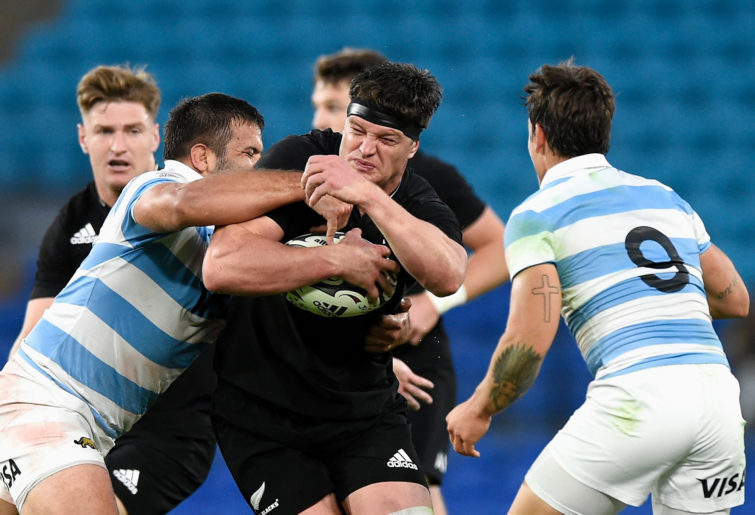
(Photo by Matt Roberts/Getty Images)
“There’s too much contact. In my day you could throw a blanket over the forwards and there was space on the field. We ran upright without lowering our heads in contact.
“It’s crazy these pick and goes where they drive head first into each other. Today the game doesn’t require the forwards to go in. Instead they fan out to create a blockade. It’s so structured now, aggressive ruck clean-outs, big forwards defending in back lines. It’s not pretty”
A return of rucking, not being permitted to have your head below your hips when you carry, and greater provisions regarding the duty of the ball carriers were some ideas discussed to improve the game but it’s not straight forward.
These aren’t the ramblings of an out-of-touch amateur. Kirkpatrick played 289 first class matches and never left the field injured. Apart from a couple of sprained ankles, a broken nose and thumb, he’s a picture of good health. In his 60s he rode his bike from Wellington to Auckland.
Contrast Kirkpatrick’s condition with that of 33-year-old former All Blacks lock James Broadhurst. The Poverty Bay locals are friends and Broadhurst retired in April 2017 after failing to recover from the ongoing effects of concussion. He still struggles to exercise at the gym and suffers regular headaches.
From 2005 to 2010 Kirkpatrick was appointed by Colin Cooper as a mentor to the Hurricanes.
“I really enjoyed that role. The Hurricanes loosies at the time were hard-nosed and dynamic, superb to watch. Rodney So’oialo and Chris Masoe were class players and then there was Jerry Collins.
“Jerry was different at first, a bit aloof but once he opened up he’d tell these hair-raising stories of what he’d been through. I was very upset when he died. He was a special man.”
This year Kirkpatrick’s name was applied to the Heartland championship player of the year award.****
“You never forget your roots and where it all started. To have my name attached to the Heartland player of the year award is a great honour and something I am truly humbled by. Heartland rugby remains an integral part of our game, its pathways and its deep connection to rural New Zealand.”
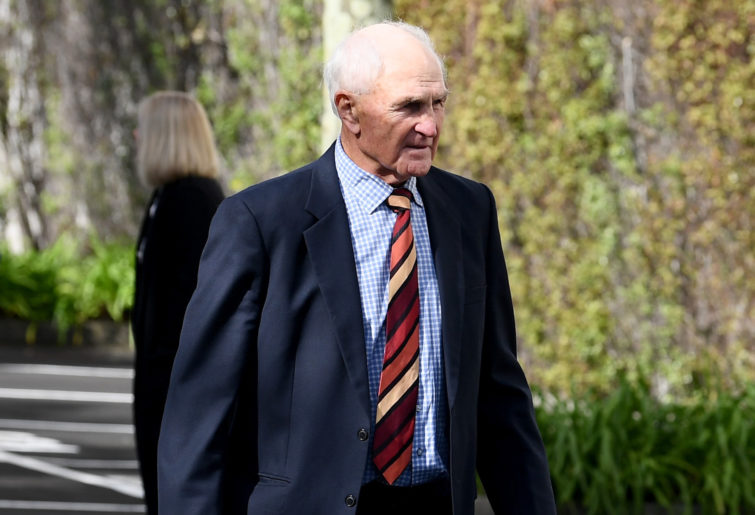
Former All Blacks rugby player Ian Kirkpatrick. (Photo by Hannah Peters/Getty Images)
Notes
*From the time Kirkpatrick made his debut in a 40-3 win over Eastern Canada on October 18, 1967 and played his last Test, a 10-9 win against the British and Irish Lions on August 13, 1977, 113 different All Blacks had debuted in the same period.
Alex Wyile (11 Tests) and Alan Sutherland (ten Tests) were the most capped loose forwards in the period from 1967-77. Bevan Holmes and Iain Eliason combined for 50 games but no Tests when Kirkpatrick was in the team.
Kirkpatrick won 88 games in a black jersey and scored 16 Test tries, a record until passed by wing Stu Wilson in 1983.
Kirkpatrick scored 115 first class tries. Zinzan Brooke (161) and Kel Tremain (136) are the only other forwards with over 100 first class tries in New Zealand history.
**Ian played 85 games for Poverty Bay and scored 31 tries. Lock forward Colin played 64 games and David captained the province several times in his 59 appearances as a lock/loose forward and was good enough to play four New Zealand trails.
The Savile Cup polo trophy is one the oldest sporting trophies in New Zealand. In 1891, a year after the New Zealand Polo Association was formed, Captain Savile (aide-de-camp to the Governor-General) presented a trophy to be “played for annually by the polo clubs in New Zealand”.
It’s still played for as the national club championship and John, David and Colin helped Poverty Bay win the prize in 1974 and 1975. Ian was a member of the 1993 Poverty Bay winning team.
***The Replacement of injured players was added to the 1968-69 laws. Ireland’s Mike Gibson replaced Welshman Barry John in the Lions’ first Test against South Africa in 1968, the first official replacement in a Test match.
Tactical substitutions were introduced in 1996 with three replacements allowed.
****The Heartland Championship player of the year award was first given out in 2006 and won by Poverty Bay flyhalf Scott Leighton.
Peter Rowe from Whanganui is the only multiple winner of the award in 2010 and 2012.






































































































